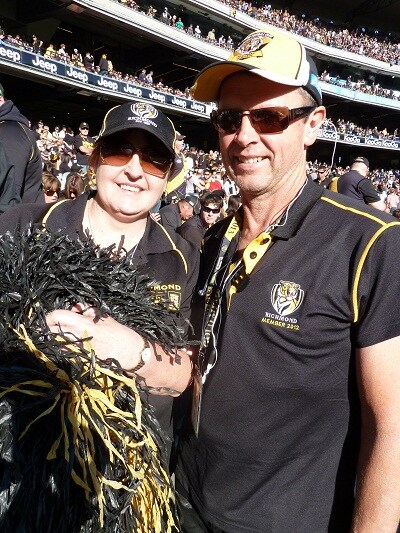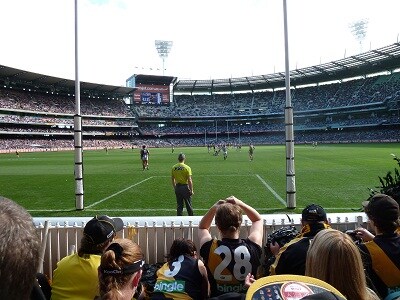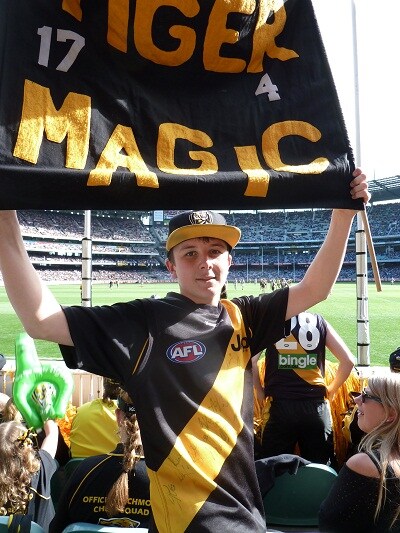“It’s getting ugly,” says Mandy Woodward, 51, late in the third quarter, her synopsis on the state of play shared by many within earshot. On Saturday afternoon, sitting four rows from the fence directly behind the Punt Road end goals, in the heart of the Official Richmond Cheer Squad, I watch Travis Cloke at the 19-minute-mark kick a long goal from the members’ wing – his fourth for the quarter – and shadows at the MCG all at once look menacingly long.
For a day that had begun in glorious sunshine, a pall was cast. Choir masters wearing black and white stood in the aisles to lead a chorus. A slow and resonant Coll-iiing-wooood chant reverberated around the Great Southern Stand. Their team was on song, and their army was all too happy to join in.

A run of play immediately after half-time changed the mood within the stadium irrevocably. Three goals down became four, became five, became six. The tide was running out hard and no Richmond player looked capable of stopping it. In 25 minutes of football, hearts sank and hope was lost. Collingwood were on a roll. It became their day, not ours. The sun lowered on imagined possibilities. A cool resignation took hold. The spoils would go to them. The glory would go to them. All the joy would be with them.
**
“That sun’s got a bit of kick in it,” says somebody behind me before the first bounce, in a meteorological observation that I think to be a parable of the day. A wonderful crowd turned up for the occasion – the season’s first home game at the MCG, against an old foe, under clear skies. The banner had been raised, scarves held aloft, jungle drums summoned, and the sun shone on us.
I had arranged to watch the game with Mandy, who I met one Wednesday night in a modest red-brick community hall in the backstreets of Richmond, while helping make the crepe-paper run-through for the season’s first game. Mandy cooks the sausages for the cheer squad members who make the banner. I know where my bread is buttered. It’s always good to curry favour with the person who wields the tongs.
“The cheer squad is like one big family,” says Mandy at quarter-time, among good cheer after a team-lifting Jake King goal before the bell has the Tigers up by 11 points. “Sometimes we fight like family, but at the end of the day we all look out for each other. We all accept each other for who we are.”
Mandy sits in the row in front of me, beside husband Ken, who pours cups of coffee from a thermos, and each of them with an earpiece in one ear listening to the 3AW commentary. Her Richmond story began seven years ago. She started following the Tigers because one of her work colleagues – and a friend - was Jake King’s mother.
Previously, she had barracked for Carlton, in the days of Peter Bosustow, Bruce Doull, Rod Austin and Rod Ashman, before she had three children and family responsibilities. “All my kids are Carlton and my former husband is Carlton,” she says, before adding with a smile: “That’s why I divorced him.”
Ken has three children also from a prior marriage, and prior allegiances. “I follow her,” he says, when asked about his loyalties. The curious thing is, he’s wearing a Yellow and Black cap and top, and is sitting in the midst of the 321 MCG seats reserved for the Richmond cheer squad, but when pressed further, the truth comes out. “I barrack for Essendon,” he says. “Everyone here knows that.”
Certainly none question Mandy’s commitment. She holds a rope when the banner is raised at each game, and rarely misses a match. “I went to every game last year, but I am missing one in WA this year,” she says. “It’s on a Monday night. It’s all a bit too hard.”
**
“It’s an exciting time for the Richmond Football Club,” says Fox Footy commentator, Brad Johnson, before the first bounce, and that’s how it was early in Saturday’s game. Jack Riewoldt in the second minute splits a pack – marks don’t come more contested than this – and from the pocket kicks his first goal. Daisy-chains of handballs look threatening through the middle. Tyrone Vickery keeps his feet against Ben Reid and runs in a second goal. The contest is willing – there’s such raw physicality to the play when up close to the boundary – and my team is able.

Jake King finds the ball in space on 50, slots a goal, and hangs his fist in the air like a pagan warrior. It is an image to savour. Under a divine sun, the football gods look to be shining on us.
In the second quarter, Brett Deledio, in the defensive 50, plucks a one-handed mark as if he were picking high-hanging grapes. It looks effortless. Luke McGuane out-foxes three Collingwood defenders on the goal line and poaches his first. Shane Edwards is lively. Troy Chaplin’s chip kicks pinpoint targets. Vickery takes a contested mark, kicks a goal, and we go into half-time three points to the good.
**
It’s a carnival in the cheer squad at the main break. A raffle is drawn. Animated conversations among friends are resumed. The sun shines. A large plastic tub of muffins is passed around by David Ward, 49, a cheer squad committee member who’s also an amateur pastry chef. “Cooking is a passion,” he says. “I’ve been doing it all my life.”
Another of his passions is the congeniality and acceptance of the cheer squad. “It’s very much a family environment,” he says. “Everyone’s treated the same. People can be from all walks of life, but when we’re at the football we all come together as one.”
Mandy is cautiously optimistic of how the game may unfold. “I reckon they’re holding their own,” she says. “Collingwood are a good side. This is a good test for us. If we can beat them we’re doing really well.”
**
Brent Crosswell, a man who played in eight grand finals for four premierships, but who I know better as my Year 11 Australian history teacher, was known on the football field as “Tiger”. He was one of the great characters of the game – once turning up late for a match because he was at a political protest – and never have I known a teacher like him. He taught us about Federation, the Harvester judgement and the basic wage, de Groot and the New Guard, and the hardships of the Great Depression.
Then, between curriculum requirements, he told stories, wonderful stories of his travels after football – of a lovers’ tryst in Paris, a romance on a kibbutz in Israel, a courtship on the banks of the Yarra. He kept a classroom of boys in thrall, he fired our imaginations.
But, what I remember most about Brent Crosswell, was his simple adage that the best way to defend is to defend. During a lesson about Gallipoli, or the battlefields of northern France and the military tactic of “going over the top”, our teacher was palpably upset and shaken by the thought of so many young men dying so needlessly in the misguided pursuit of the infantry charge. He could make no sense of it. He was vexed by the injustice and inhumanity of it. Attack was a mistaken form of defence, he would say. Why couldn’t these men be allowed to stay in their trenches, and defend with defence?
I’ve never been comfortable with the analogies of football as warfare. A football ground is a playing field, not a battlefield. Players are not soldiers. I have visited the sparse country of El Alamein in North Africa – the last great killing field of Australian men – and seen the headstones, and read the names of Australian men, all so young and dead and buried so far from home. It is a disservice to the fallen, and those who returned, to compare football with the horrors of war. Theirs was not a game.
In the third quarter last Saturday, however, I am reminded of Brent Crosswell’s adage – that the best form of defence is defence – and how it can apply to any combat. Why could we not get numbers behind the ball? Why could we not stop their run? Why could we not deny them, by blocking and shepherding and tackling and scrapping our way back into the game? Why could we not defend with defence?
**
“They’re rattled, they’re really rattled,” says Andrew Freeman, 23, from Glen Iris, who sits beside me and all afternoon offers succinct, quietly-spoken commentary of the game that rings true. “The efficiency’s really dropped. Collingwood’s kicking percentage is through the roof. It’s dangerous.”

From seat 9 in row D in bay M3, there is much to enjoy about the afternoon. The ground looks a treat. The grass glistens silver in the afternoon sun. There is a great sense of occasion and tradition to the day. And, late in the third quarter, when Heath Shaw in defence kicks wide into sunlight and space on the wing, into the tumbling arms of a galloping Harry O’Brien, I come to enjoy the industriousness of Collingwood.
To understand an opponent, you must first respect them.
I come to think in the maelstrom of the third quarter that a game of football is like a puzzle and, on this day, it looks as though my team cannot work it out. But it’s not for want of trying. Jack Riewoldt is tireless throughout and, from my vantage, he is the pick of our players. He never stops leading and presenting. His hands are clean. His kicking is good.
Three acts on the day epitomise his leadership. The big pack mark he takes in the opening minutes. His clearance from a centre-square bounce late in the third quarter, when otherwise it had all been one-way traffic. And, his scrambled goal in the dying minutes of the third quarter, as a show of defiance.
It wasn’t so much the goal that mattered, but his abridged celebration afterwards. It unfolded in front of me: the awkward bouncing ball, his gather, a kick, then a blur of tangled bodies on the goal line and Jack – his head swathed in tape – raising two fists to the crowd lining the fence. It was an acknowledgment of their support, and a little signal that there was still hope, all wasn’t lost.
Jack Riewoldt is, as they say, a player who wears his heart on his sleeve. He is also an honest footballer. Often he plays the role of the team joker, the court jester, which looks to mask his deeply competitive ambition. From this side of the fence, it appears as if he would bleed for the Club. He would hurt for them. Losses sting him. The desire burns strong. Nobody can doubt his commitment to the team, and to the Club and its supporters.
Jack Riewoldt is a Tasmanian, he has much Tiger in him.
As it would turn out, with his goal late in the third, all hope was not lost. My team had chances early in the last quarter – they could have chiselled deeper into the deficit, created doubt in the minds of Collingwood players, wrested back an opportunity for themselves. But they didn’t. Not this day.
Late in the game a chant is roused – If you love Richmond stand up – and all around us take to their feet. It is a tonic, a moment of solidarity, an opportunity to express our gratitude and acknowledge who we are. For this minute, I feel pride. It does not matter that we don’t win. We are standing as one and voicing our support.
“They were just too good for us, but we’ll learn from it,” says Mandy. “We didn’t let them run away with it at the end, they didn’t blow us away, which is good.”
A song is sung at the end of the game, but it is not our song. The cheer squad collect their belongings – floggers and pompoms and flags and banners – for the walk back to Punt Road. Talk is of next week, of the game against Fremantle. No team coached by Ross Lyon has ever lost to Richmond. The assignment in Perth now takes on greater importance. My team needs to regroup and regather and find a way to win a long way from home, without local support.
I have no doubt they’re up for the challenge. They are capable of pinching a win against Fremantle. They need to play as if their backs are to the wall, as if this game means everything to them, as if theirs is a mission in thievery cloaked in darkness.
Mandy will be at the game on Friday night. She’s flying over to hold up the banner and lend cheer. It’s her birthday this week. I hope the team win for her. She’s a loyal woman. She’s a Tiger woman. She’s a woman who appreciates the companionship of football.
Tiger, tiger burning bright.
or Twitter: @dugaldjellie



